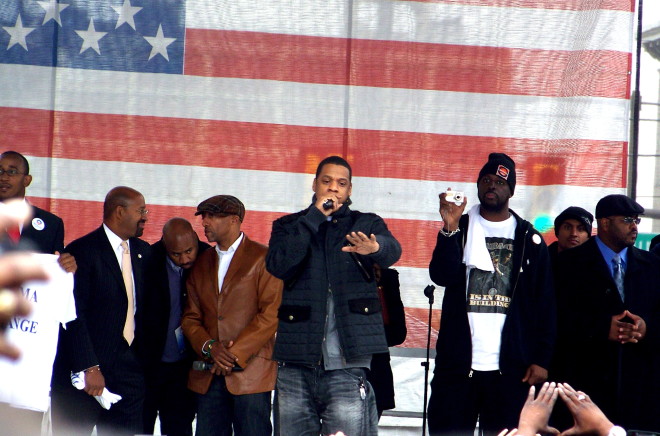From Hollywood, with Money
BY ARYEH MELLMAN
One hundred and fifty of the biggest stars on the planet crowded onto the basketball court in George Clooney’s backyard. Actors, comedians, and even some former royalty were in attendance. Heck, a couple of super heroes even stopped by: Robert Downey Jr. and Tobey Maguire. In the midst of so much star power, no one could be faulted for struggling to determine the focus of this event. Yet when a slim, smiling man stepped to the podium, it was clear to all that President Obama was in charge tonight.
Obama did not want for celebrity attention during either of his presidential campaigns. Aside from Clooney’s backyard-fest, he attended events hosted by musical visionaries Jay-Z and Beyonce, and fashion icons Sarah Jessica Parker and Anna Wintour. In contrast to his first campaign, Obama had a government to run during his second swing around the country, in addition to his whirlwind celebrity campaign. With such limited time, placing Hollywood parties so high on the presidential priority list remains somewhat puzzling.
If you want medical advice, you ask a doctor. If you want your clothes fixed, you go to a tailor. Even if your tailor reads articles about medicine in his spare time, or volunteers at a hospital, you wouldn’t trust him with your health. Yet during political elections, a surprising phenomenon ensues: celebrities, who usually have little more than a passing interest and knowledge in politics, but a large platform to speak from, give political advice, and voters actually listen to them! Unsurprisingly, most voters are loath to admit that Kim Kardashian has a stronger influence on their political preferences than Fareed Zakaria. A 2010 North Carolina State survey demonstrated that when asked, college students say that they would discount political advice from celebrities. However, surveys are not always representative of true intent, as people tend to answer survey questions in ways that portray them more positively; those responses are not always reflective of reality.
According to a well-publicized study, Oprah Winfrey’s endorsement of Obama in his 2008 primary was worth around one million votes. In a bitterly contested primary where Obama only received about 40,000 more votes than Hillary Clinton, the magnitude of a million vote swing, or even any number in that ballpark, is impossible to overstate. This effect is not only restricted to the Oprah’s of the world; the study concluded that “lesser celebrities would still have an effect.” Yet even this persuasive power of celebrities doesn’t convey the full extent of their influence. In 2008, when the political circumstances all but guaranteed victory for the Democratic candidate, Oprah donated the maximum allowable amount of personal cash, $2,300. In 2012, when the race was much tighter, she went through Super PAC’s to wire over $75,000 to the Obama campaign. In a climate where finances are often viewed as having an undue influence on politics, money talks. Loudly.
Going back to that magical night at Clooney’s, each of the 150 celebrities who attended paid $40,000 for the privilege, raising an easy $6 million for Obama. A few extra seats were raffled off to ordinary people, which raised an additional $9 million (who wouldn’t drop 20 bucks for the chance to hang out with Iron Man and Obama?). In total, the Obama campaign raised almost $15 million in one night, more than one percent of his total war chest. While the celebrities paid larger prices per person, tens of thousands of people entered the raffle to join them, belying the notion that celebrities have no impact on campaigns. The rafflers may not have consciously supported Obama just because Clooney did, but money speaks louder than words.
Since celebrities have such large bank accounts to draw from, and more free time than most people, it is no surprise that they choose to throw their weight around on issues that are important to them. Truly staggering though, is the degree to which they can influence elections, using both their Twitter accounts and their wallets. Even though they may have no better grasp on politics than a tailor does of medicine, the size of their influence far outweighs their expertise.
